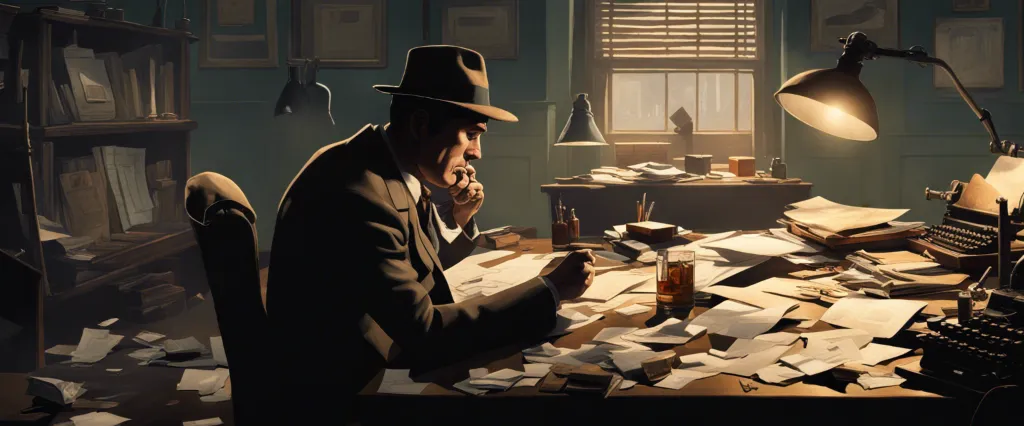
In the realm of classic American literature, two timeless novels stand apart – “The Long Goodbye” by Raymond Chandler and “The Great Gatsby” by F. Scott Fitzgerald. While seemingly different in genre and subject matter, these two masterpieces share several intriguing similarities worth exploring.
First published in 1953, “The Long Goodbye” is quintessentially a hardboiled detective novel, featuring the renowned private detective Philip Marlowe. Chandler takes us through the gritty underbelly of 1940s Los Angeles, unraveling a tale of corruption, betrayal, and redemption. In stark contrast, “The Great Gatsby,” published in 1925, centers around Jay Gatsby, a mysterious and enigmatic millionaire, as he pursues an unattainable dream amidst the lavish extravagance of the Jazz Age. Although the settings may vary, both novels delve deeply into the darker aspects of the American Dream, exploring the disillusionment and emptiness that lie beneath the surface of seemingly glamorous lives.
In examining these novels, it becomes clear that both Chandler and Fitzgerald possess a remarkable ability to capture the essence of their respective eras. Chandler’s writing encapsulates the post-World War II pessimism and the moral ambiguity that prevailed in 1950s America, while Fitzgerald’s evocative prose paints a vivid picture of the hedonistic excesses and social upheaval of the Roaring Twenties. Both authors adeptly use their chosen genres – crime fiction and literary fiction – to comment on the social and cultural climate of their times.
While “The Long Goodbye” and “The Great Gatsby” explore different themes and stories, they share a common thread in their portrayal of flawed and complex characters. Philip Marlowe and Jay Gatsby are both outsiders – individuals striving to fit into a society they feel detached from, each in their own distinct way. Marlowe, the disillusioned detective, functions as a critique of societal corruption and hypocrisy, navigating a world filled with treachery and deceit. On the other hand, Gatsby embodies the embodiment of the American Dream, a self-made man yearning for acceptance and love from those who inhabit the upper echelons of society. Together, these characters propel their respective narratives forward and become emblematic of the broader themes explored within each work.
As we embark on this comparative journey, it is essential to delve into the similarities and differences between “The Long Goodbye” and “The Great Gatsby,” examining their distinctive styles, themes, and characterizations. Ultimately, this study aims to highlight the enduring relevance and literary significance of these two novels, illustrating how they continue to captivate readers and offer poignant commentary on the human condition in different epochs of American history.
Brief Summary of Two Books
The Long Goodbye by Raymond Chandler
The Long Goodbye by Raymond Chandler is a detective novel featuring his iconic private detective, Philip Marlowe. Set in California in the 1950s, the story begins with Marlowe befriending Terry Lennox, a charismatic war veteran and alcoholic, who later becomes a suspect in the murder of his wife Sylvia. Marlowe’s loyalty to Lennox prompts him to help him flee to Mexico.
Months later, Lennox is found dead in Mexico, apparently by suicide. However, Marlowe is skeptical and begins an investigation to uncover the truth behind Lennox’s death and the events leading up to it. His inquiries lead him deep into the corrupt and violent underbelly of Los Angeles, where he encounters powerful and dangerous individuals.
Throughout the book, Marlowe encounters a cast of intriguing characters, including a seductive nightclub singer named Linda Loring, her wealthy, manipulative husband, Roger Wade, and the sadistic gangster, Marty Augustine. As he delves deeper into the case, Marlowe uncovers a web of deceit, betrayal, and murder; ultimately exposing the dark secrets hidden beneath the glamorous facade of Los Angeles society.
The Long Goodbye is not just a riveting crime novel but also explores themes of loyalty, friendship, and the moral ambiguity of human nature. With Chandler’s signature hard-boiled prose, the book offers a gritty portrayal of post-war Los Angeles and a captivating mystery that keeps the reader guessing until the final pages.
The Great Gatsby by F. Scott Fitzgerald
“The Great Gatsby” is a classic novel written by F. Scott Fitzgerald and published in 1925. It is set in the lavish and glittering world of 1920s America, during a period known as the Roaring Twenties. The story is narrated by Nick Carraway, a bond salesman from the Midwest who moves to New York City to pursue a career in finance.
Nick becomes neighbors with Jay Gatsby, a mysterious and wealthy man who holds extravagant parties at his opulent mansion. Gatsby is infatuated with Daisy Buchanan, a married woman he had a passionate affair with years ago. As the story unfolds, it becomes clear that Gatsby’s sole motivation in life is to win Daisy back. He reinvents himself from a poor young man into a millionaire to impress her.
Through Nick’s perspective, readers learn about the social and moral decay prevalent in the wealthy upper class of the time. Fitzgerald delves into themes of wealth, love, and the impossibility of recapturing the past. The characters navigate a world of superficiality, hedonism, and illusion, as they attempt to fulfill their desires. However, their pursuit of happiness becomes marred by betrayal, tragedy, and disillusionment.
In the end, “The Great Gatsby” serves as a reflection of the American Dream and the inherent flaws and hollowness of a society driven by material wealth and social status. Fitzgerald’s poetic prose and intricate storytelling paint a portrait of a society on the brink of collapse, illustrating the destructive power of illusions and the consequences of living in pursuit of a fleeting and unattainable dream.
Comparison between Two Books

Similarities in Self Discovery
The Long Goodbye by Raymond Chandler and The Great Gatsby by F. Scott Fitzgerald both explore the theme of self-discovery through their respective protagonists’ journeys, unraveling the complexities of their identities and aspirations.
In The Long Goodbye, Philip Marlowe, the series’ iconic private detective, embarks on a quest to uncover the truth behind Terry Lennox’s alleged involvement in his wife’s murder. Along the way, Marlowe encounters a wide array of characters and navigates the corrupt and murky landscape of 1940s Los Angeles. As he delves deeper into the case, Marlowe not only unravels the dark secrets that surround Lennox, but he also discovers more about his own values, integrity, and place in the world. Through this process, Marlowe undergoes a transformative journey of self-discovery.
Similarly, The Great Gatsby follows Jay Gatsby’s pursuit of the American Dream and his quest to win back the love of his life, Daisy Buchanan. Set against the backdrop of the opulent Jazz Age, Gatsby reinvents himself as a wealthy businessman in a desperate attempt to rise above his humble origins and win Daisy’s affection. Along the way, Gatsby becomes entangled in a web of decadence, infidelity, and social stratification, ultimately realizing that the American Dream he once idealized is merely an illusion. This realization forces Gatsby to confront the true essence of his identity and question the authenticity of his aspirations, leading to a profound moment of self-discovery.
Both novels portray self-discovery as a turbulent and often disillusioning process. Marlowe and Gatsby face disillusionment as they confront the realities of their desires and the flawed society in which they live. They realize that the identities and dreams they have been pursuing are ultimately unattainable or unsustainable. This disillusionment forces them to confront their own flaws and the inherent shortcomings of the worlds they have immersed themselves in.
Furthermore, both characters find themselves caught in a moral gray area, struggling to navigate the ethical dilemmas and compromises that arise throughout their journeys. Marlowe is faced with the constant temptation of succumbing to the corruption and immoral actions of those around him, while Gatsby becomes entangled in a world of deceit and betrayal in his pursuit of love and social status. These experiences contribute to their growth and self-discovery, as they navigate the intricate webs of deceit and compromise in search of personal meaning and redemption.
In conclusion, The Long Goodbye and The Great Gatsby both explore self-discovery as an arduous and disillusioning process for their respective protagonists. Through their journeys, Philip Marlowe and Jay Gatsby confront their own identities, dreams, and the flawed societies in which they exist. The novels demonstrate the transformative power of self-discovery, forcing these characters to reassess their values, confront their flaws, and ultimately find some form of redemption.
Divergences in Self Discovery
The Long Goodbye by Raymond Chandler and The Great Gatsby by F. Scott Fitzgerald are both classic novels that explore the disillusionment and moral corruption prevalent in American society during the early 20th century. While these books share certain themes, such as the exploration of class divisions and the futility of the American Dream, they diverge significantly when it comes to the topic of self-discovery.
In The Long Goodbye, the protagonist, Philip Marlowe, embarks on a journey of self-discovery that exposes the dark underbelly of Los Angeles. Marlowe is an introspective and morally upright detective who, throughout the novel, grapples with his own moral compass and his role as a truth-seeker in a corrupt society. He is relentless in his pursuit of justice, despite facing numerous challenges and moral compromises along the way. Marlowe’s self-discovery is characterized by his unwavering integrity, and he ultimately learns that even in a world filled with deception and betrayal, it is essential to remain true to oneself.
On the other hand, The Great Gatsby presents a stark contrast in terms of self-discovery. The novel’s protagonist, Jay Gatsby, is a self-made millionaire who becomes infatuated with the idea of reclaiming the love of his life, Daisy Buchanan. However, Gatsby’s pursuit of the American Dream and his obsession with wealth and social status blind him to the shallow and materialistic nature of his desires. In his quest to win Daisy’s affection, Gatsby loses sight of his true self and becomes a mere facade, hiding behind extravagant parties and false personas. The novel’s exploration of self-discovery in The Great Gatsby is thus one of tragic disillusionment as Gatsby realizes the hollowness of his aspirations and the impossibility of recapturing the past.
While both novels depict characters grappling with their identities, The Long Goodbye offers a more uplifting perspective on self-discovery. Marlowe’s journey of introspection and moral clarity enables him to navigate the morally corrupt society he uncovers, maintaining his integrity and personal values. In contrast, The Great Gatsby presents a tragic descent into self-delusion, with Gatsby’s pursuit of material wealth leading to his ultimate downfall.
In conclusion, The Long Goodbye and The Great Gatsby diverge significantly when it comes to the theme of self-discovery. While The Long Goodbye portrays self-discovery as a search for truth and moral integrity, The Great Gatsby depicts the devastating consequences of pursuing an illusory version of oneself based on shallow desires. These books offer distinct perspectives on the nature of self-discovery, with Chandler’s novel delivering a more hopeful and virtuous outlook, while Fitzgerald’s work emphasizes the consequences of misguided aspirations and the elusive nature of the American Dream.

Conclusion
Both The Long Goodbye by Raymond Chandler and The Great Gatsby by F. Scott Fitzgerald are considered classics in the world of literature. Choosing between them ultimately depends on personal preferences and interests.
The Long Goodbye, a hardboiled detective novel, is praised for its complex plot, realistic characters, and Chandler’s unique writing style. It delves into themes of corruption, loyalty, loss, and the dark underbelly of society. If you enjoy mysteries and noir literature, you will likely find The Long Goodbye captivating and thought-provoking.
On the other hand, The Great Gatsby is a literary masterpiece that explores the decadence and disillusionment of the Roaring Twenties. Fitzgerald’s lyrical prose and keen observation of society provide a poignant critique of the American Dream. The novel delves into themes of love, social class, wealth, and identity. If you appreciate poetic language, character studies, and social commentary, The Great Gatsby is the ideal choice for you.
Ultimately, both books are worthy of reading. If you are drawn to dark mysteries and hardboiled detective tales, go for The Long Goodbye. However, if you prefer introspective novels that explore the complexities of human nature and society, The Great Gatsby is an excellent option.



